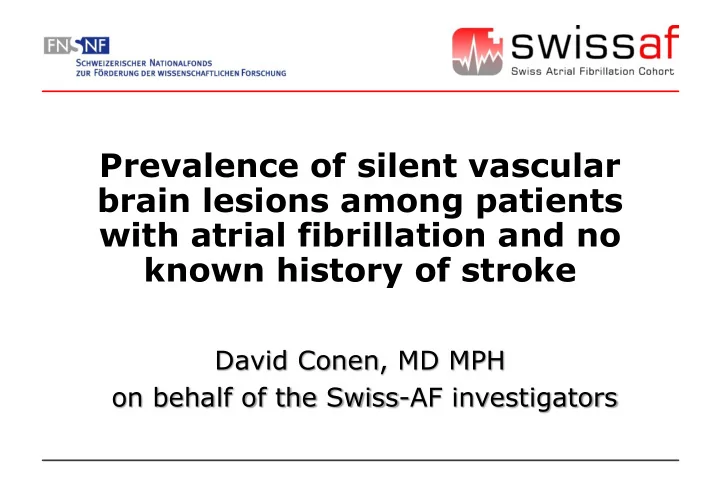

Prevalence of silent vascular brain lesions among patients with atrial fibrillation and no known history of stroke David Conen, MD MPH on behalf of the Swiss-AF investigators
2
Disclosures • David Conen received consulting fees from Servier, Canada Funding • The Swiss-AF cohort study is supported by grants of the Swiss National Science Foundation (Grant numbers 33CS30_1148474 and 33CS30_177520). • David Conen holds a McMaster University Department of Medicine Mid-Career Research Award. His work is supported by the Hamilton Health Sciences RFA Strategic Initiative Program 3
Background I • Atrial fibrillation (AF) is the most common cardiac arrhythmia in the general population 1 • The incidence of AF is estimated to double until 2060 2 • Patients with AF have an increased risk of stroke, death, congestive heart failure and poor quality of life 3,4 1 Camm AJ et al. Guidelines for the management of atrial fibrillation: the Task Force for the Management of Atrial Fibrillation of the European Society of Cardiology (ESC). Eur Heart J. 2010;31:2369-429 2 Krijthe et al. Projections on the number of individuals with atrial fibrillation in the European Union, from 2000 to 2060. Eur Heart J. 2013;34(35):2746-2751 3 Conen D, Chae CU, Glynn RJ, et al. Risk of death and cardiovascular events in initially healthy women with new-onset atrial fibrillation. JAMA. 2011;305(20):2080-2087. 4 Chatterjee NA, Chae CU, Kim E, et al. Modifiable Risk Factors for Incident Heart Failure in Atrial Fibrillation. JACC Heart Fail. 2017;5(8):552-560.
Background II • More recent evidence suggests that patients with AF also face an increased risk of cognitive decline and dementia 1 • The underlying mechanisms for this relationship is currently unknown 1 Kalantarian S et al. Cognitive impairment associated with atrial fibrillation: a meta-analysis. Ann Intern Med. 2013;158:338-46.
Clinically overt ischemic infarction 6% / year Microbleeds Microangiopathy Silent infarction Asymptomatic Cognitive Impairment? Dementia?
Aim & hypothesis • To assess the frequency of silent brain lesions among AF patients without a clinical history of stroke or transient ischemic attack in a large and unselected sample of patients with documented AF • We hypothezised that patients with documented AF have a large number of previously unknown brain lesions
Methods • Ongoing prospective multicenter observational cohort study (n=2415 patients enrolled among 14 centers in Switzerland) • Eligibility criteria: history of documented AF, age ≥65 years • Standardized information on personal characteristics, risk factors, co-morbidities, antithrombotic treatment and other factors was obtained • Brain magnetic resonance imaging (MRI) was obtained according to a standardized protocol • Brain MRIs were analyzed in a central core lab by blinded assessors
Results • Brain MRI scans available in 1’736 patients • 13% had a history of stroke, 9% a history of a TIA, leaving 1’388 Variable n=1’388 Mean age 72 ± 9 Female Sex 27 % Paroxysmal AF 45% Oral Anticoagulation 90% History of hypertension 68% History of diabetes 14% History of coronary artery disease 26% History of heart failure 21% CHA 2 DS 2 -VASc score 2.8 ± 1.4
Results II Prevalence of silent MRI lesions 45% 41% 40% 35% 30% 25% 19% 20% 16% 15% 15% 10% 5% 0% Infarction Lacune Microbleeds ≥1 lesion
Conclusion • Four out of ten patients with AF but without a clinical history of stroke or transient ischemic attack had clinically unrecognized (‘silent’) brain lesions • These silent lesions may at least in part explain the increased risk of cognitive decline in patients with AF • The relationships of individual brain lesions with cognitive function needs to be assessed in future studies • Better brain protection in AF patients seems warranted
Recommend
More recommend